
The undergraduate program in Artificial Intelligence & Machine Learning (AI & ML) was introduced from the academic year 2022-23 with an intake of 60 seats, duly approved by the All India Council for Technical Education (AICTE), New Delhi.
AI & ML is a rapidly advancing field at the forefront of modern technology, offering immense potential across various sectors. Artificial Intelligence focuses on creating systems capable of performing tasks typically requiring human intelligence—such as reasoning, decision-making, strategizing, and problem-solving—without explicit programming for each scenario. Machine Learning, a core component of AI, enables computers to learn from data, identify patterns, and make informed decisions or predictions.
In today’s digitally driven world, industries such as healthcare, finance, manufacturing, e-commerce, cybersecurity, robotics, and transportation are increasingly dependent on AI & ML technologies to enhance efficiency, automate processes, and gain competitive advantages. This has created a high demand for professionals equipped with expertise in AI and ML, making this program highly relevant and career-oriented.
This course is ideally suited for students passionate about programming intelligent systems, data-driven decision-making, and building solutions that emulate human cognitive abilities. Throughout the program, students will explore the theoretical foundations and practical applications of AI and ML. They will gain hands-on experience in designing, developing, and deploying intelligent systems using state-of-the-art tools and frameworks.
Graduates of this program will be well-positioned for promising careers in roles such as:
- AI/ML Engineer
- Data Scientist
- Business Intelligence Developer
- Natural Language Processing Engineer
- Computer Vision Engineer
- Robotics Programmer
- AI Research Scientist
Vision
- To become a Globally recognised Institution that excels in providing quality education and fostering the development of highly skilled professionals in the field of Artificial Intelligence and Machine Learning.
Mission
- To provide a comprehensive and rigorous academic curriculum that equips students with the knowledge, Skills and Expertise required excelling in realm of Artificial Intelligence.
- To fostering a culture of innovation, critical thinking and ethical practices, while promoting inter-disciplinary collaboration and research.
- To empower our students to become leaders and contribute to the advancement of Artificial Intelligence on a global scale with the help of dedicated faculty, state-of-the-art facilities and industry partnerships.
Programme Outcomes
- PO1: Engineering Knowledge: Apply knowledge of mathematics, science, engineering fundamentals and an engineering specialization to the solution of complex engineering problems.
- PO2: Problem Analysis: Identify, formulate, research literature and analyze complex engineering problems reaching substantiated conclusions using first principles of mathematics, natural sciences and engineering sciences.
- PO3: Design/ Development of Solutions: Design solutions for complex engineering problems and design system components or processes that meet specified needs with appropriate consideration for public health and safety, cultural, societal and environmental considerations.
- PO4: Conduct investigations of complex: Problems using research-based knowledge and research methods including design of experiments, analysis and interpretation of data and synthesis of information to provide valid conclusions.
- PO5: Modern Tool Usage: Create, select and apply appropriate techniques, resources and modern engineering and IT tools including prediction and modeling to complex engineering activities with an under- standing of the limitations.
- PO6: The Engineer and Society: Apply reasoning informed by contextual knowledge to assess societal, health, safety, legal and cultural issues and the consequent responsibilities relevant to professional engineering practice.
- PO7: Environment and Sustainability: Understand the impact of professional engineering solutions in societal and environmental contexts and demonstrate knowledge of and need for sustainable development.
- PO8: Ethics: Apply ethical principles and commit to professional ethics and responsibilities and norms of engineering practice.
- PO9: Individual and Team Work: Function effectively as an individual, and as a member or leader in diverse teams and in multi-disciplinary settings.
- PO10: Communication: Communicate effectively on complex engineering activities with the engineering community and with society at large, such as being able to comprehend and write effective reports and design documentation, make effective presentations and give and receive clear instructions.
- PO11: Project Management and Finance: Demonstrate knowledge and understanding of engineering and management principles and apply these to owners own work, as a member and leader in a team, to manage projects and in multidisciplinary environments.
- PO12: Life-long Learning: Recognize the need for and have the preparation and ability to engage in independent and life-long learning in the broadest context of technological change.
Program Specific Outcomes (PSO)
- Apply tools and techniques in Artificial Intelligence and Machine Learning to address multidisciplinary problems.
- Expertise in identifying, Analysing , Designing and Developing Systems by applying principles and concepts of Devops , MangoDB, Project Management with GIT, Block-Chain Technology and MLOps.
Program Educational Objectives (PEO)
- Apply practical engineering skills to pursue ethical and productive careers in the Artificial Intelligence and machine learning domain, as well as in related industries and organizations.
- Possess a foundation that enables and promotes qualified individuals to pursue advanced technical and professional degrees.
- Demonstrate adequate breadth to successfully transition into various professional areas, such as business, and management.
| Name | Qualification | Designation |
| Dr. Soumya Patil | B.E., M.Tech., Ph.D. | Professor & HOD |
| Dr. S. Ambareesh | B.E., M.E., Ph.D. | Associate Professor |
| Ms. Ashwini M. Gorte. | B.E., M.Tech. | Associate Professor |
Two classrooms
- Journal Publications (Only Scopus Indexed): 4
- Conference Publications (Only Scopus Indexed): 2
- Books Authored: Nil
- Book Chapters: Nil
- Patents Granted/Registered: Nil
- Patents Published: 1
- MoUs: Nil
Faculty Achievements
- Dr. Soumya Patil was invited to give an expert talk on “Memory and Introduction to Pipelining” at Atria Institute of Technology on 20-11-2024.
- Dr. S. Ambareesh was a subject expert in the faculty selection committee for the faculty recruitment held on 25th January 2025 at Akash Institute of Engineering and Technology, Bangalore.
- Dr. S. Ambareesh received a “Certificate of Appreciation” for providing Valuable support and cooperation as a “Program Committee Member and Reviewer” in the 5th International Conference on Paradigms of Communication, Computing and Data Analytics (PCCDA 2025) organized by Pt. Lalit Mohan Sharma Campus, Rishikesh, Sri Dev Suman Uttarakhand University, Uttarakhand, India held during January 18–19, 2025.
- Dr. S. Ambareesh received a ‘Certificate of Appreciation’ for providing valuable support and cooperation as a Program Committee Member and Reviewer in the 5th International Conference on Computational Intelligence (ICCI 2024) held during December 24th to 26th, 2024 at Sardar Vallabhbhai National Institute of Technology (NIT,) Surat, India.
- Dr. S. Ambareesh served as a ‘Special Session Chair’ for International Conference on Smart Health and Intelligent Technologies (ICSHIT 2024) by Atlantic Press, Springer Nature, held on December 30th to 31st, 2024, at Shri Shankaracharya Institute of Professional Management and Technology, Raipur, Chhattisgarh, India.
|
Details of papers published by faculty members |
||||||||
|---|---|---|---|---|---|---|---|---|
| Title of Paper | Name of the Author(s) | Department | Name of Journal | Year of Publication | ISSN Number | Journal Website | Article Link | Scopus/Web of science |
| Crop yield prediction: two-tiered machine learning model approach | Sushila Shidnal, Dr. Mrityunjaya V Latte, Ayush Kapoor | AIML | International Journal of Information Technology | Oct-21 | 2511-2104 | Link | Link | SCOPUS |
| An effect of nutrient deficiency on yield estimation | Sushila Shidnal, Dr. Mrityunjaya V Latte | AIML | International Journal of Recent Technology and Engineering | Sep-19 | 2277-3878 | Journal Website | PDF Link | SCOPUS |
| Implementation of IoT and Image processing in smart agriculture | Sushila Shidnal, Ayush Kapoor, Sucheta Bhat, A Mehra | AIML | CSITSS 2016 | Oct-16 | 978-1-5090-1023-3 | IEEE Xplore | Link | SCOPUS |
| Multiple nutrient deficiency detection in paddy leaf images using color and pattern analysis | Sushila Shidnal, Dr. Mrityunjaya V Latte | AIML | ICCSP 2016 | Apr-16 | 978-1-5090-0396-9 | IEEE Xplore | Link | SCOPUS |
| Automated detection of eye diseases | Sushila Shidnal, Amit Asish Bhadra, Manu Jain | AIML | WiSPNET 2016 | Mar-16 | 978-1-4673-9339-3 | IEEE Xplore | Link | SCOPUS |
| A secure and energy-efficient routing using coupled ensemble selection approach and optimal type-2 fuzzy logic in WSN | S. Ambareesh, Pundalik Chavan, S. Supreeth, Rajesh Nandalike, P. Dayananda, S. Rohith | AIML | Scientific Reports, Vol 15, No. 38 | 2025 | 2045-2322 | Nature Scientific Reports | Link | SCI, Q1 |
Student Achievements
-
Mr. Priyanshu Tiwari, a second-year student, received an appreciation letter from Dr. Prabhu M.L.V.,
Professor and Head of the Department of Periodontology at Krishnadevaraya College of Dental Sciences and
Hospital, for his research project. The CNN based model for detecting bone loss and diagnosis has been
presented at the International Digital Dentistry Congress (International Conference) and will be deployed at
the college for further study, under the mentorship of Dr. Vani Priya, HoD MCA, and Dr. Soumya Patil, HoD
AIML.
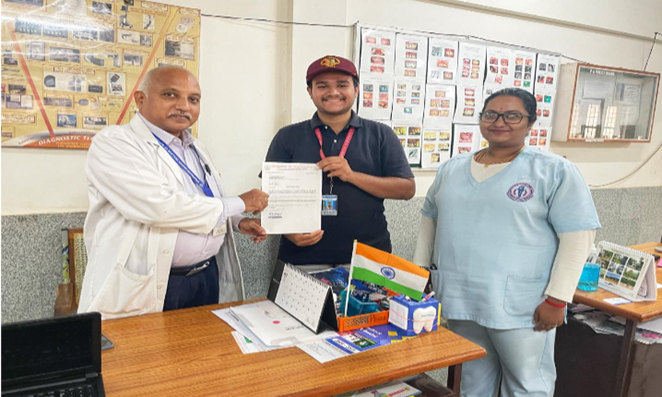 Abhinav kumar 4 th sem AIML student has contributed as Team manager in Team MARS of SIR MVIT. He contributed
in cart design and chessi report and was the main technician who assembled engine seat electric wiring etc.
He was the driver of the cart who represent our college in the Indian supercarting series which was held in
Ujjain powered by Hindustan motors. And their team got 7 trophy in different categories along with
championship and best team.
Abhinav kumar 4 th sem AIML student has contributed as Team manager in Team MARS of SIR MVIT. He contributed
in cart design and chessi report and was the main technician who assembled engine seat electric wiring etc.
He was the driver of the cart who represent our college in the Indian supercarting series which was held in
Ujjain powered by Hindustan motors. And their team got 7 trophy in different categories along with
championship and best team.
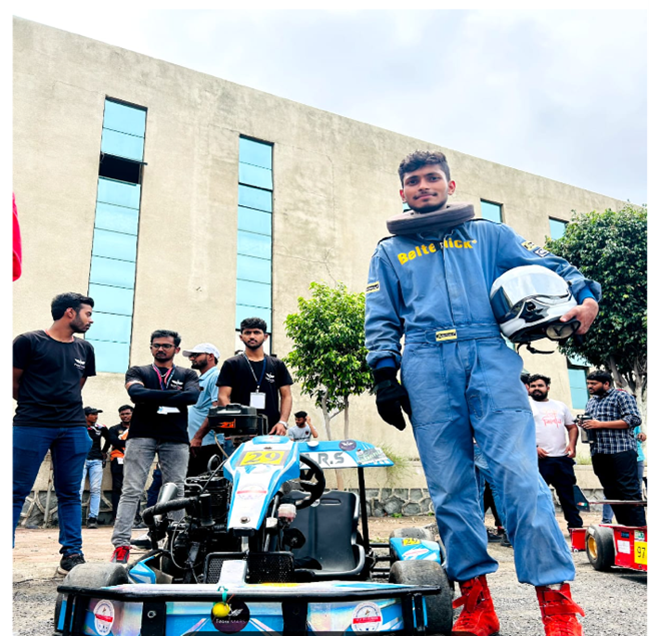
-
M. Vachan Raju of S4 has participated in chess competition held at Gopalan College of Engineering &
Management on 27 March 2025. He won second prize with cash prize worth Rs. 2000.
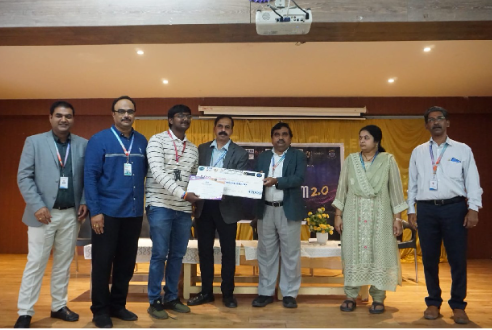
-
Sneha S Naik (S4) has successfully completed a 24-hour hackathon conducted by The Great Bangalore
Hachathon from 15 to 16 March 2025.
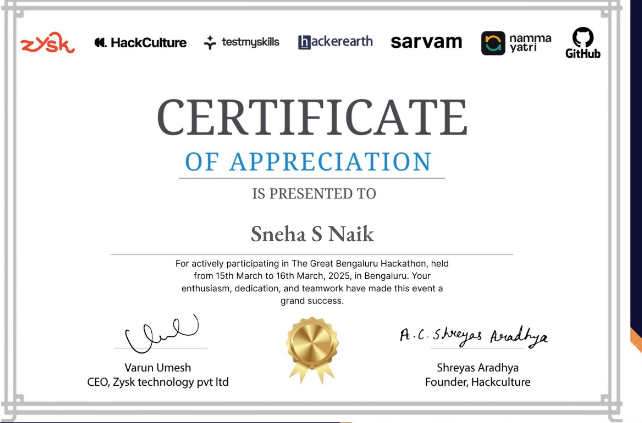
Priyanshu Tiwari S5 has completed a research project on integrating deep learning with Ka-band TWTA at the esteemed government organization DRDO (MTRDC), under the guidance of Dr. Anurag Srivastava, Scientist 'F' and Deputy Director of MTRDC Lab.
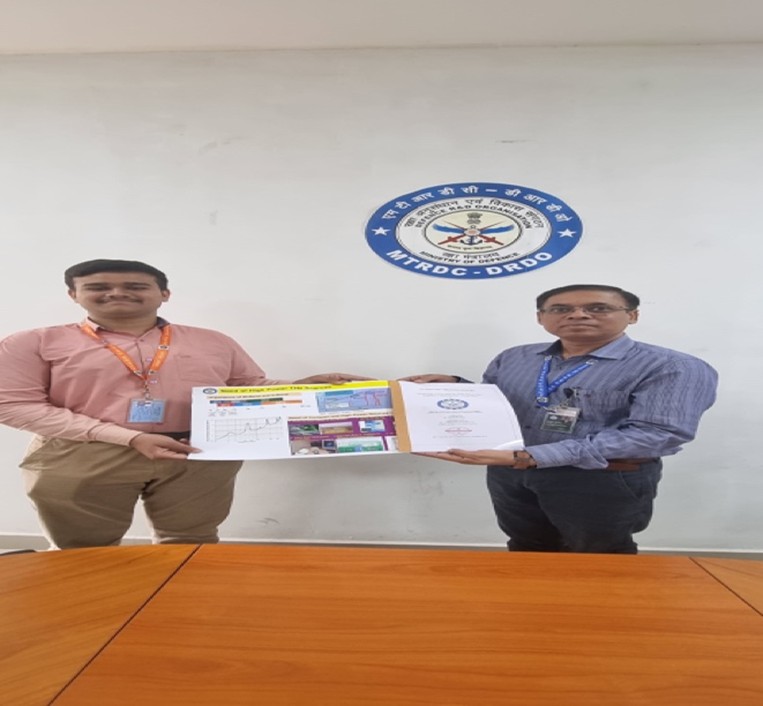
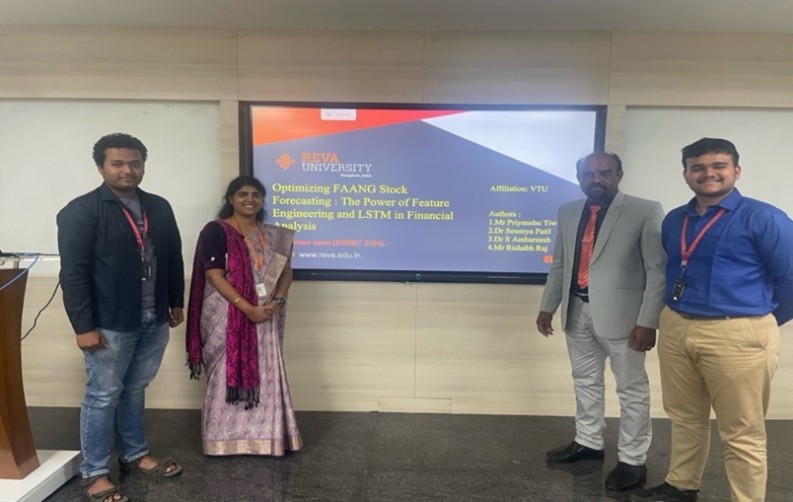
Priyanshu Tiwari (S5) and Rishabh Raj (S3) presented a research paper titled 'Optimization of FAANG Stock Prediction Using LSTM and Future Engineering Analysis' at the International Conference on Artificial Intelligence in Reshaping Business Landscape, held at REVA Business School on 12 Dec 2024, under the guidance of Dr. Soumya Patil and Dr S. Ambareesh.
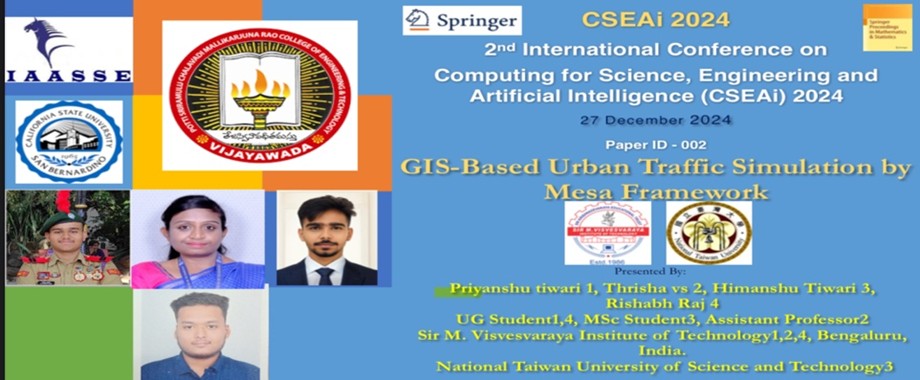 Priyanshu Tiwari (S5) and Rishabh Raj (S3) presented a research paper titled 'GIS-Based Urban Traffic Simulation
Using MESA Framework' at the 2nd International Conference on Computing for Science, Engineering, and Artificial
Intelligence, held virtually at California State University on 27 Dec 2024. The paper will published in the Springer
book series Proceedings in Mathematics and Statistics. The work was conducted under the guidance of Assistant
Professor Trisha V.S. from the CSE Department and Mr. Himanshu Tiwari, a MS student at the National Taiwan
University of Science and Technology.
Priyanshu Tiwari (S5) and Rishabh Raj (S3) presented a research paper titled 'GIS-Based Urban Traffic Simulation
Using MESA Framework' at the 2nd International Conference on Computing for Science, Engineering, and Artificial
Intelligence, held virtually at California State University on 27 Dec 2024. The paper will published in the Springer
book series Proceedings in Mathematics and Statistics. The work was conducted under the guidance of Assistant
Professor Trisha V.S. from the CSE Department and Mr. Himanshu Tiwari, a MS student at the National Taiwan
University of Science and Technology.
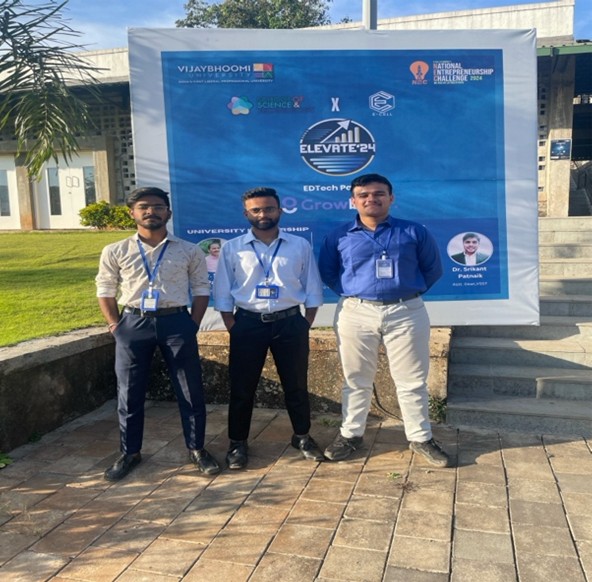
Priyanshu Tiwari (S5), Prithesh Ram Keshri (S5), and Areesh Jabbar (S7) were selected as finalists in the national-level hackathon Neural Nexus held at Vijaybhoomi University in Karjat on 7 th and 8 th Dec 2024, Maharashtra. They secured a place among the top 10 teams out of 1,230 teams participating in the event, organized by Unstop.
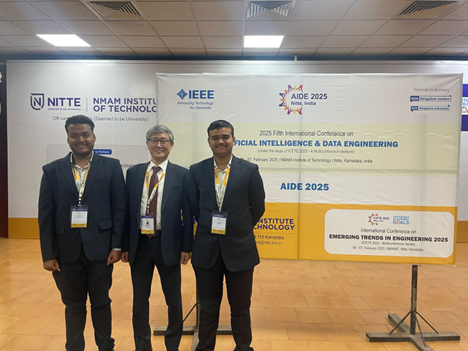
PRIYANSHU TIWARI (S6) and RISHABH RAJ have presented their paper titled "Optimizing FAANG Stock Forecasting: The Power of Feature Engineering and LSTM in Financial Analysis" at the IEEE International Conference on Artificial Intelligence and Data Engineering at NMAMIT on February 6th and 7th, 2025, under the guidance of Dr. Soumya Patil and Dr. S. Ambareesh.
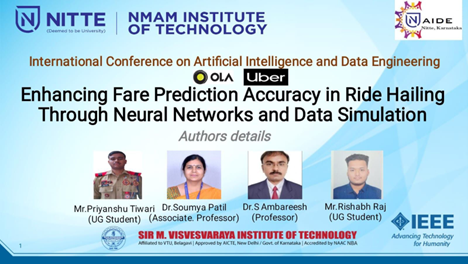
PRIYANSHU TIWARI (S6) and RISHABH RAJ have presented their paper titled "Enhancing Fare Prediction Accuracy in Ride Hailing Through Neural Networks and Data Simulation" at the IEEE International Conference on Artificial Intelligence and Data Engineering at NMAMIT on February 6th and 7th, 2025, under the guidance of Dr. Soumya Patil and Dr. S. Ambareesh.
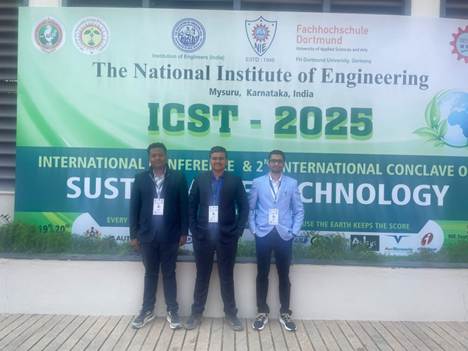
PRIYANSHU TIWARI (S6) and RISHABH RAJ have presented their paper titled "Dynamic Stability Classification in Smart Grid Using Feed Forward Neural Network" at the Government Organization IEI (Institute of Engineers India) INTERNATIONAL CONFERENCE ON SUSTAINABLE TECHNOLOGY at NIE Mysore on February 19th and 20th, 2025, under the guidance of Dr. S. Ambareesh, Dr. Sheshappa S.N, and Assistant Professor Trisha V.S. They were also joined by their college peers Himanshu Tiwari (MS Student at National Taiwan University) and Aditya Kumar (RVITM, Bangalore).
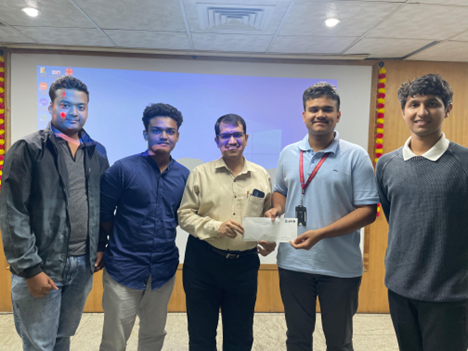
Priyanshu Tiwari (3rd year,AIML) and Dhananjay Kumar (3rd year,AIML), along with juniors from different departments—N. Ram Srujan Raj (1st year, CSE) and Rishabh Raj (2nd year, ISE)—won 1st prize (₹10,000) at the Hackons Hackathon, which was conducted at Jain University.
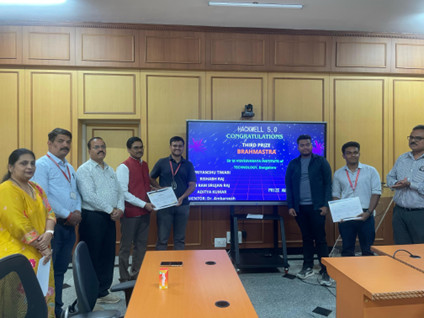
Priyanshu Tiwari (3rd year,AIML) along with juniors from different departments—N. Ram Srujan Raj (1st year, CSE) and Rishabh Raj (2nd year, ISE) and Aditya Kumar(2nd year ISE ,RVITM)—won 3rd prize (₹25,000) at the Honey Well 48 hours Hackathon, which was conducted at JSS on 4 and 5th april .
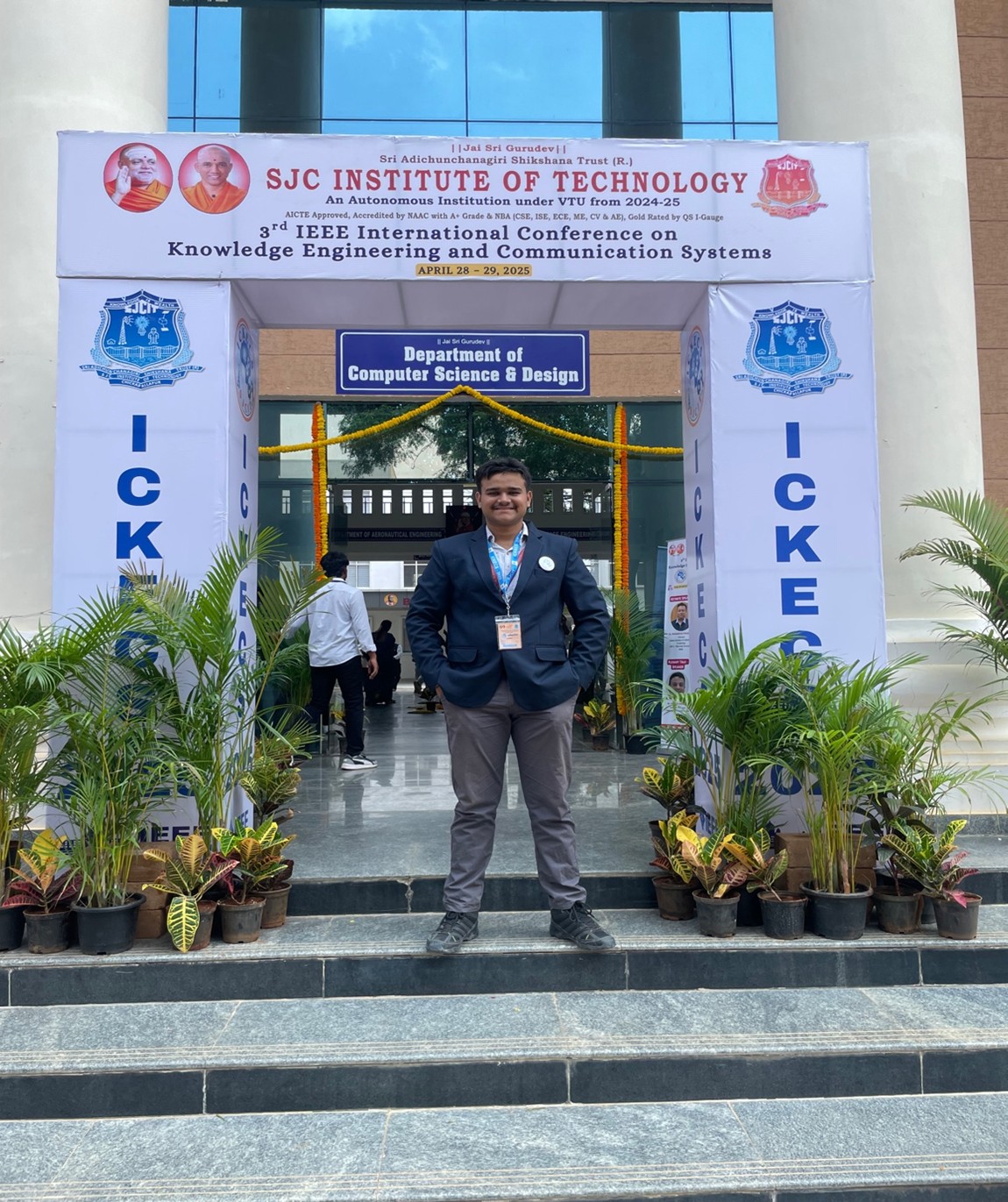
Priyanshu Tiwari has successfully presented his 6th research paper, titled "Prediction of Traveling Ka Band Wave Tube Amplifier Characteristics Using FNN", which has been accepted for presentation and publication at the 3rd IEEE International Conference on Knowledge Engineering and Communication Systems (ICKECS-2025).This remarkable work was carried out in collaboration with DRDO’s Dr. Anurag Srivastava (Scientist ‘F’) and Dr. Ambareesh Sreenivasan (Professor, AIML).Special appreciation to Himanshu Tiwari and Akshat Sharma, the co-authors, for their valuable contributions. This research is a significant step in the advancement of high-frequency communication systems and deep learning integration.
- One day SDP “TECHNICAL PAPER WRITING AND PUBLICATION”
- one day SDP on “Innovative Approaches to Algorithmic Design” on 12-07-2024.
- One day workshop “Angel investment /VC funding opportunity for early stage Entrepreneurs”
Digitalization of society is changing the ways people act and interact. United Nation report "Digital Economy Report 2021" estimates Global Monthly data traffic to be 780 exabytes by 2026.
Artificial Intelligence adoption is expected to be worth $190 billion by 2025. By 2030, AI technology will add $15.7 trillion to global gross domestic product (GDP). According to the International Data Corporation (IDC), the AI market in India is projected to reach $ 7.8 billion by 2025. Report from Accenture ‘Rewire for Growth’ stated that AI has the potential to add nearly $957 billion, or 15% to the India's current gross value in 2035.
AI could enable the accomplishment of 134 targets — out of 169 — across all U.N. Sustainable Development Goals.
Report from Gartner indicates AI/ML would create 2.3 million jobs by the year 2026.
Job Opportunities
- Artificial Intelligence Data Analyst / Developer / Engineer / Expert
- Applied Artificial Intelligence Engineer
- Automation Engineer
- Business Intelligence Analyst / Developer
- Data Analyst / Engineer / Scientist
- Data Security Analyst / Engineer
- Machine Learning Architect / Developer / Engineer / Expert
- Research Scientist
- Software Analyst
Council of Europe COE- History of Artificial Intelligence
https://www.coe.int/en/web/artificial-intelligence/history-of-ai1956-The term "AI" could be attributed to John McCarthy of MIT (Massachusetts Institute of Technology), which Marvin Minsky (Carnegie-Mellon University) defines as "the construction of computer programs that engage in tasks that are currently more satisfactorily performed by human beings because they require high-level mental processes such as: perceptual learning, memory organization and critical reasoning.
NASSCOM launches first AI Adoption Index for Indiahttps://indiaai.gov.in/news/nasscom-launches-first-ai-adoption-index-for-india
NASSCOM, along with EY and with support from Microsoft, EXL and Capgemini, has developed a first-of-its-kind AI Adoption Index for India. The study 'Tracking India's Sectoral Progress on AI Adoption' intends to assess AI adoption in India and dive deep into the four key sectors which are leading India's AI story - Banking and Financial Services (BFSI), Consumer Products and Retail, Healthcare, and Industrials and Automotive which contribute nearly about 70 per cent of the $500 billion in value that AI and data can unlock for India.
‘AI in Defense’ (AIDef) symposium and exhibition75 Artificial Intelligence products/technologies -https://pib.gov.in/PressReleasePage.aspx?PRID=1840740
The products, launched as part of ‘Azadi Ka Amrit Mahotsav’ celebrations, fall under various domains. These include AI Platform Automation; Autonomous / Unmanned / Robotics systems; Blockchain based Automation; Command, Control, Communication, Computer & Intelligence, Surveillance & Reconnaissance; Cyber Security; Human Behavioral Analysis; Intelligent Monitoring Systems; Lethal Autonomous Weapon Systems; Logistics and Supply Chain Management, Operational Data Analytics; Manufacturing and Maintenance; Simulators / Test Equipment and speech/voice analysis using Natural Language Processing.
AI/ML adoption in the Public Sector: Three ways to get started
Machine learning (ML) and Artificial Intelligence (AI) are creating more personalized and easier digital experiences for constituents.
India’s Artificial Intelligence (AI) market is expected to witness a growth of 20% over the next five years https://www.hindustantimes.com/business/indias-ai-market-likely-to-see-20-growth-over-next-five-years-report-101656480360788.html
Joint study conducted by Microsoft and the Internet and Mobile Association of India (IAMAI)
AI and ML will help Life Sciences companies develop treatments faster and more efficiently in the future, reducing the costs of health care, while making it more accessible to patients.
UNESCO - Recommendation on the Ethics of Artificial Intelligence https://unesdoc.unesco.org/ark:/48223/pf0000381137
UNESCO’s groundbreaking document which was adopted in November 2021 by the 193 UNESCO Member States which defines a set of common values and principles for the healthy development and deployment of AI technologies around the world.


